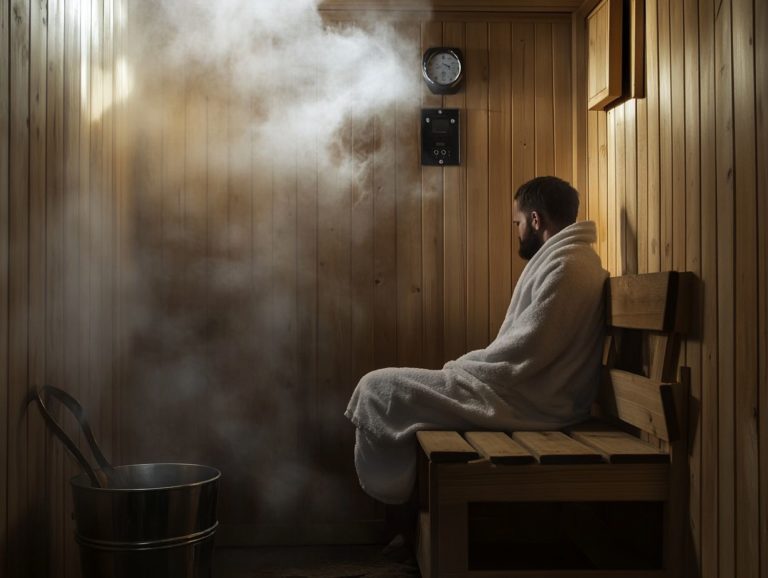Sauna Safety: The Importance of Open Minds
Saunas have long been revered for their extensive health benefits, touching on both physical and mental well-being. From detoxification and enhanced circulation to stress relief and deep relaxation, the appeal of a sauna session is undeniably compelling. To enjoy these benefits, prioritize safety.
This article delves into the advantages of regular sauna use while highlighting crucial safety precautions and tips to ensure your experience is both safe and enjoyable.
Whether you re new to saunas or a seasoned enthusiast, grasping these elements will empower you to maximize the benefits while minimizing any potential risks.
Contents
- Key Takeaways:
- The Benefits of Sauna Use
- The Importance of Sauna Safety
- Precautions to Take Before Using a Sauna
- Sauna Safety Tips
- Frequently Asked Questions
- 1. What is the concept of “Open Minds” in regards to sauna safety and etiquette?
- 2. Why is it important to have an open mind when using a sauna?
- 3. Are there any specific safety guidelines for using a sauna with an open mind?
- 4. How does having an open mind contribute to a safer sauna experience?
- 5. What are some common risks associated with not having an open mind in the sauna?
- 6. Is having an open mind only important for personal safety in the sauna?
Key Takeaways:
Here s what you need to know:

- Open your mind to the many physical and mental health benefits of sauna use, but be aware of the potential risks and precautions needed to ensure safety.
- Before stepping into a sauna, stay hydrated and understand your physical and medical limitations to avoid any potential harm.
- Sauna safety is a balance of understanding risks and benefits. Proper hydration, temperature control, and limiting time and frequency of use can help maintain a safe and enjoyable experience.
The Benefits of Sauna Use
Using a sauna presents an abundance of health benefits, significantly enhancing your physical and mental well-being. Regular sauna sessions can improve circulation, aid in muscle recovery, and boost your respiratory health and cardiovascular health, making it an excellent practice for anyone pursuing overall health.
Sauna therapy helps reduce stress and promotes relaxation. The act of sweating assists in detoxification and inflammation reduction. Whether you lean towards a traditional sauna or favor the newer infrared sauna which uses light to create heat that penetrates the body the therapeutic effects encompass enhancements in skin health, immune function, and even weight loss, all contributing to a more vibrant and healthier lifestyle.
Physical and Mental Health Benefits
The physical and mental health benefits of sauna use are truly remarkable, influencing various aspects of your well-being, from immune function to pain management. Regular sauna bathing can significantly ease chronic pain conditions like arthritis and fibromyalgia while also reducing inflammation and enhancing overall muscle recovery.
Sauna sessions have shown impressive results for those with respiratory issues such as asthma and chronic obstructive pulmonary disease by opening airways and facilitating easier breathing. But it doesn’t stop there; the mental health benefits are just as compelling.
The soothing heat can lead to effective stress reduction and elevate your mood. You might find that anxiety levels decrease as you enjoy a heightened sense of relaxation, contributing to an overall sense of well-being.
These combined benefits not only encourage a healthier lifestyle but also foster resilience against the daily challenges life throws your way.
The Importance of Sauna Safety
Sauna safety is key to enjoying all the health benefits. While sauna therapy can elevate relaxation and boost circulation, it s imperative that you remain mindful of potential hazards, such as heat exposure, dehydration, and fluctuations in blood pressure, especially if you have a chronic illness.
Embracing these considerations allows you to enjoy your sauna experience to the fullest, ensuring both safety and wellness while aiding in toxin elimination.
Risks and Precautions

Sauna risks vary based on your health and sauna use. It s essential to take the right precautions before diving in!
Consider your medical history, especially if you have conditions like chronic fatigue syndrome or heart problems. This will help ensure a safe and pleasant sauna experience.
Certain individuals, particularly those with heart problems, may see their heart rate and blood pressure fluctuate more than usual. This can lead to complications if not monitored closely. If you struggle with respiratory illnesses, the dry heat might worsen your symptoms, making it harder to breathe comfortably.
Autoimmune disorders can also pose unique challenges. The extreme heat might trigger flare-ups, especially for those with systemic lupus erythematosus. Therefore, consult a healthcare provider before starting regular sauna sessions. They can provide personalized guidance to ensure a safe and enjoyable experience.
Precautions to Take Before Using a Sauna
Before you step into a sauna, make sure to take these essential precautions! This is especially important if you have chronic illnesses or specific health concerns.
Stay hydrated and know your heat tolerance. This will help reduce risks during sauna use. Prioritizing these precautions can transform your visit into a truly beneficial ritual that enhances your wellness routine.
Physical Precautions
Physical precautions are crucial for ensuring safety during sauna sessions. Prioritize proper hydration and understand the right sauna session length to avoid overheating.
Ensure you’re adequately hydrated before stepping into the sauna. This promotes energy expenditure and maintains joint mobility.
To enhance your sauna experience, regularly check your energy levels throughout the session. Consider stretching beforehand to improve flexibility and comfort.
If you re new to the sauna, start with shorter durations around 5 to 10 minutes and gradually increase your time as your body adjusts, while monitoring your hydration.
Remember to sip water before, during, and after your sauna session to restore lost fluids and prevent dehydration. Stay attuned to your body’s signals. If you feel dizziness or excessive sweating, exit the sauna promptly. For more tips on staying safe, check out sauna safety and understanding risk factors. Your well-being should always come first!
Medical Precautions
Understanding the medical precautions before using a sauna is crucial, especially if you have a history of chronic illness or fluctuating blood pressure. Consulting with a healthcare provider is your best bet for determining whether sauna therapy aligns with your health management strategies.
A thorough evaluation is essential since chronic conditions like cardiovascular disease or asthma can significantly affect your response to heat exposure. Monitor your symptoms closely to avoid complications.
Watch for changes in your health, such as increased shortness of breath or unusual fatigue while enjoying the sauna.
Gradual acclimatization to heat and staying properly hydrated are key to ensuring a safe and rewarding experience. You may need to adjust the frequency and duration of your sauna sessions based on your tolerance and insights from your healthcare provider, considering your medical history. Understanding the impact of environment on sauna safety can also play a crucial role in your overall experience.
Sauna Safety Tips

Implementing sauna safety tips can significantly enhance your experience while minimizing potential risks. This ensures that your sauna sessions remain a valuable part of your wellness routine and promote better cardiovascular health.
Key practices to consider include:
- Maintaining proper temperature control: Keep sauna heat at a comfortable level for you.
- Monitoring your hydration levels: Drink water to prevent dehydration.
- Being mindful of how often you use the sauna: Limit sessions to avoid overdoing it.
Proper Hydration and Temperature Control
Proper hydration and temperature control are essential for a safe and rewarding sauna experience. They significantly impact how effectively you get rid of toxins by sweating and promote heart health.
Drink plenty of fluids before and after your sauna session. Keep a close eye on temperature levels and consider following sauna use guidelines for the elderly to create the ideal atmosphere for relaxation and health benefits.
Maintaining proper hydration not only enhances the detoxification process but also helps regulate your body’s core temperature (the internal temperature of your body), preventing overheating. When using the sauna, monitoring the heat is crucial. Start at lower temperatures and gradually increase them to find your comfort zone. Always listen to your body if you start feeling lightheaded, take a break!
Regarding sauna etiquette, being mindful of others’ comfort by adjusting temperatures thoughtfully and ensuring everyone stays hydrated contributes to a more enjoyable environment for relaxation. It’s also vital to understand sauna safety through open communication.
Limiting Time and Frequency of Use
Limiting the time and frequency of your sauna sessions is crucial for maximizing benefits while minimizing risks like heat exposure and dehydration. Establish a balanced routine that aligns with your health needs. Aim for sessions lasting between 15 to 30 minutes to enhance your energy expenditure without overwhelming your body.
Start with shorter sauna sessions and gradually increase the duration and frequency as your body adapts. This helps you avoid discomfort and ensures a more enjoyable experience. If you have specific health concerns, such as cardiovascular issues or respiratory conditions, consult a healthcare professional before integrating sauna use into your routine. Additionally, understanding sauna safety can enhance your overall experience.
Listening to your body is equally important. If you experience fatigue, dizziness, or excessive sweating, reduce your exposure. By monitoring how your body responds, you can create a sustainable sauna routine tailored to your wellness goals.
Understanding Risks and Benefits
Understanding the risks and health benefits of sauna use is essential for making informed decisions about incorporating it into your wellness routine. Health advantages may include improved immune function, pain relief, and stress reduction.
However, it’s important to be aware of potential risks, especially with chronic illnesses. For example, if you have cardiovascular conditions, consult your healthcare provider before starting regular sauna sessions, as elevated temperatures can raise your heart rate and blood pressure. To ensure a safe experience, understanding sauna safety is crucial. Conversely, if you’re managing arthritis, you might find that the heat alleviates stiffness and enhances joint mobility.
Consider your health history, current medications, and overall physical condition when assessing sauna therapy. Pay attention to how your body responds during the session. This will help ensure you use the sauna safely and effectively, allowing you to enjoy its many benefits while minimizing risks.
Frequently Asked Questions

1. What is the concept of “Open Minds” in regards to sauna safety and etiquette?
Open minds refer to having an open and receptive attitude towards safety guidelines and rules while using a sauna. It involves being aware of potential risks and actively taking steps to prevent accidents or injuries. Keeping an open mind helps ensure a safe and respectful environment for everyone.
2. Why is it important to have an open mind when using a sauna?
Having an open mind allows you to understand safety precautions. This reduces the risk of accidents and injuries.
An open mind is crucial for your safety! It lets you enjoy the sauna while keeping everyone safe.
3. Are there any specific safety guidelines for using a sauna with an open mind?
Yes, there are important sauna precautions to follow.
Be sure to adhere to recommended time limits and avoid using the sauna under the influence of alcohol or drugs. Additionally, be aware of health conditions that can be affected by heat, like lung diseases or asthma.
4. How does having an open mind contribute to a safer sauna experience?
Opening your mind to safety guidelines can help prevent accidents and injuries, such as burns or dizziness.
It also promotes a respectful and considerate environment among sauna users.
5. What are some common risks associated with not having an open mind in the sauna?
Not having an open mind can result in burns from hot surfaces or fainting from overheating.
It may also lead to conflicts with other users, disrupting the peaceful atmosphere.
6. Is having an open mind only important for personal safety in the sauna?
Absolutely! An open mind not only keeps you safe but also helps others enjoy their sauna experience.
By following safety guidelines and being considerate, you can contribute to a safer and more enjoyable experience for everyone.






